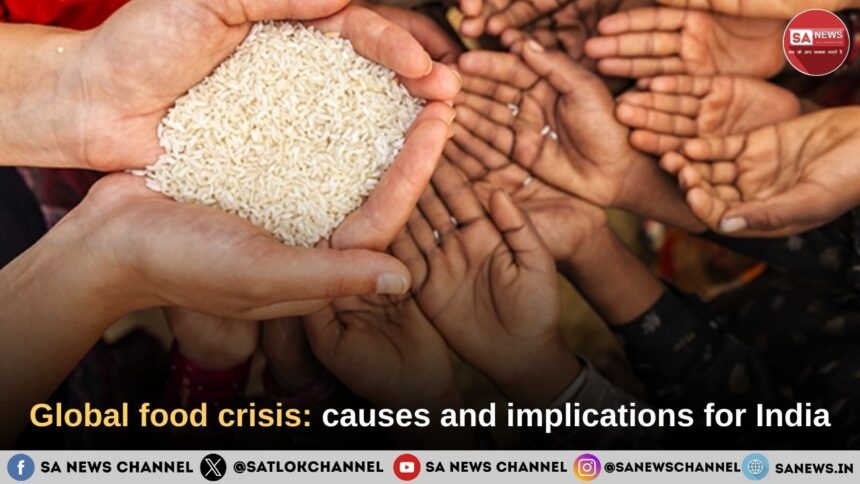The global food crisis is caused by conflict, climate change, and economic factors, leading to widespread hunger and malnutrition. For India, this crisis manifests itself in the form of reduced agricultural production due to adverse weather conditions, disruptions in the food supply chain, and rising food prices. The impacts on India include potential food shortages, increased dependence on imports, worsening food insecurity for vulnerable populations, and strains on national food security policies aimed at reducing poverty and inequality
Major causes of the global food crisis
Climate change:
Cyclones, droughts, and other extreme weather events can stunt crop growth and reduce food production, directly impacting food availability.
Conflicts and wars:
War displaces people, disrupts agriculture, and disrupts food production and distribution, reducing food availability in many countries.
Economic shocks:
Poverty increases with rising inflation and rising prices of goods. Poverty affects people’s purchasing power, resulting in them not having access to sufficient, safe, and nutritious food.
Poverty:
Poverty is a major cause of food insecurity. People do not have the money to buy enough food, which makes them victims of hunger and malnutrition.
Also Read: Poison on Your Plate: The Dark Side of Food Adulteration
The biggest problem is food.
Food waste is one of the most common problems in the food service industry. When food waste is dumped into landfills, it produces harmful greenhouse gases like methane and carbon dioxide, which contribute to global warming and climate change. Food waste harms the sustainability of our food systems.
Global food insecurity has increased.
The level of food insecurity that plagues the entire world has increased. Food insecurity is the inability to have enough and nutritious food to meet a person’s basic needs. Not available. According to the 2023 edition of the State of Global Food Security and Nutrition Report, 783 million people in the world suffered from hunger in 2022, and 345 million faced acute food insecurity. They are on their way to giving.
The revolutionary future of food
To reduce the impact and consequences of the rapidly growing food crisis in the world, NEOM has taken action to address the problem of food insecurity. Topian is a food company that aims to ensure flexible and sustainable food systems for the planet. With the launch of Topian, the Kingdom of Saudi Arabia is focusing on achieving sustainability by revolutionizing the global food system.
Need for immediate action .
As food insecurity is a global concern, timely policy actions and infrastructure development are needed to mitigate the global food crisis. It is of utmost importance to protect the most vulnerable segments of society who are directly affected by disruptions in food production and distribution systems.
FAQs on Global Food Crisis
What are the consequences of the food crisis?
Ans: Increasing rates of poverty and malnutrition
Which country has the most food problems?
Ans: Countries such as Somalia, South Sudan, Yemen, and Afghanistan face the most severe food problems.
How do people complete food challenges?
Ans: People cope with food challenges by relying on food aid, community support, or adopting survival strategies such as reducing meal frequency or portion sizes.








